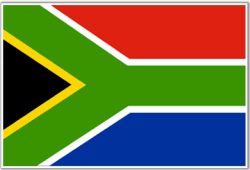Fracking watch: South Africa figures out what CA hasn’t
May 5, 2013
By Chris Reed
In early 2011, the government of South Africa imposed a moratorium on fracking — or hydraulic fracturing — in an arid, beautiful region known as the Karoo, which was home to a massive shale formation that the U.S. Energy Information Administration believes to be the fifth largest in the world.
The decision was surprising in many ways. Fracking has a long history in South Africa as an extraction process used to access water supplies in dry areas. Also, in South Africa as in the U.S., oil and gas exploration creates good-paying jobs for people with limited educations — and South Africa remains a nation with an immense gap between its well-educated, mostly white middle class and its struggling and improverished black working class. There is also this embarrassing fact: South Africa’s energy grid is so unreliable that power outages are common.
In the big picture, environmentalism is normally strongest in affluent areas which can afford strong regulation. It is often tantamount to a religion, where believers exalt themselves and morally impugn those who disagee with their views, however extreme they may be. But in South Africa, the nation’s ugly history has helped sustain a powerful environmental movement. Its leaders cynically depict development of natural resources as tantamount to a continuation of the white exploitation of blacks during the apartheid era. A leader of the anti-fracking campaign, Jonathan Deal, just won an international award last month that’s been likened to the Nobel Prize of the environmental movement.
 Fracking sanity chapter No. 9: South Africa
Fracking sanity chapter No. 9: South Africa
Nevertheless, after an 18-month investigation, the South Africa government’s Department of Mineral Resources concluded — just like the Obama administration — that fracking was just another semi-dirty-but-manageable heavy industry that needed strong regulation but was not the evil that greens assert. In September 2012, the fracking ban was lifted. This subsequent report is from The Economist:
“The Karoo, ‘the land of great thirst,’ covers much of the 800 miles between Johannesburg, South Africa’s commercial capital, and Cape Town, on the country’s southern tip. The semi-desert area (pictured) is known for its arid beauty and aching poverty. But deep beneath its sheep- and ostrich-dotted expanses could lie untold wealth—in the form of natural gas.
“America’s Energy Information Administration (EIA) suspects South Africa might boast shale-gas reserves of around 485 trillion cubic feet. The gas would only be accessible by hydraulic fracturing–“fracking”–pumping water and chemicals into rock at high pressure. In April 2011, in response to opposition from environmental groups and the local community, South Africa’s government slapped a moratorium on fracking.
“But last month Collins Chabane, a minister in the president’s office, announced that the cabinet was lifting the ban. A study by a technical task team appointed last year had eased their concerns, said Mr Chabane, and clearly showed that exploration was safe. … Three foreign companies–Royal Dutch Shell, Falcon Oil & Gas and Sunset Energy–have been granted licences to explore for gas. …
“A report published earlier this year by Econometrix, a South African think tank, argued that fracking would bring what the area so urgently needs: jobs and development. It would be transformational, gushed the study, which was sponsored by Royal Dutch Shell. If only a tenth of the estimated gas can be extracted, thousands of jobs could be created. The gas extracted could provide South Africa with 400 years’ worth of energy. For a country that regularly endures power cuts, that would mean a brighter future.”
Ignoring the history of 1 million fracked wells
If California followed a similarly rational process, it would conclude that a million fracked wells and hydraulic fracturing’s steady evolution into a far more efficient exploration tool made allowing it a no-brainer — otherwise rival states and nations would have a huge competitive advantage on the Golden State in the form of lower energy costs.
Instead, the California media covered the progress of attempts to block fracking last month in the Legislature in a way that never mentioned all the context that showed fracking was just another semi-dirty-but-manageable heavy industry, and that never mentioned that the long list of the people who believed this included regulators in the Obama administration.
As I wrote Saturday, this media sloth and ineptitude is why that every morning since April 27 I’ve been blogging about the nations around the world that think it’s a good thing to have cheap energy and have embraced fracking. So far I’ve covered Germany, China, Russia, Saudi Arabia, Brazil, Canada, Argentina and Mexico. Now it South Africa’s turn. On Monday, I will write about the nation that’s so fed up with environmentalists’ lies about fracking that it is considering limiting free-speech rights on this issue.
What’s my point? As I’ve written here before, that the fracking/brown energy revolution is coming, regardless of what greens in the Golden State and Europe want, and that California can either join in the party or get left behind.
Fracking watch: Previous posts
No. 1: Germany
No. 2: China
No. 3: Russia
No. 4: Saudi Arabia
No. 5: Brazil
No. 6: Canada
No. 7: Argentina
No. 8: Mexico
Related Articles
Dem lawmaker breaks with party over teacher tenure
Assemblywoman Shirley Weber, D-San Diego, is a former San Diego school board president and a longtime San Diego State professor.
CA Legislature attacking gun rights
April 2, 2013 By John Seiler If there’s one thing that might get me finally to move away from the
Legislature Advances Dental Socialism
FEB. 14, 2012 By KATY GRIMES As voters are growing increasingly wary of ObamaCare, the President’s nationalized healthcare plan, voters



